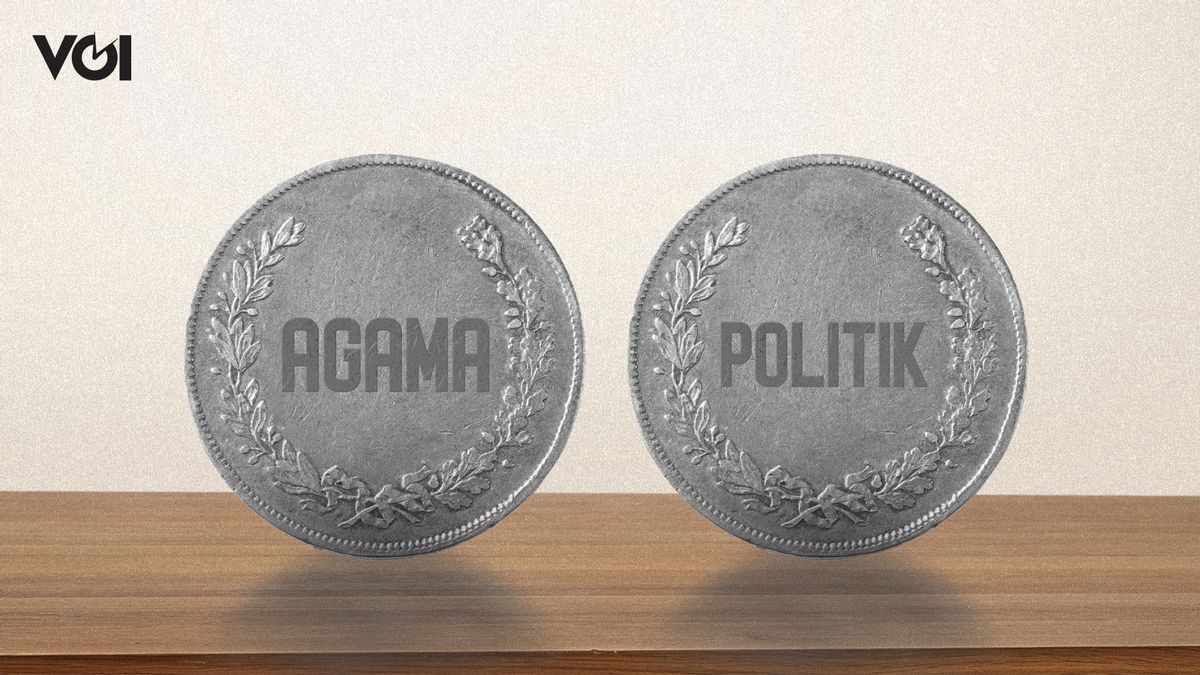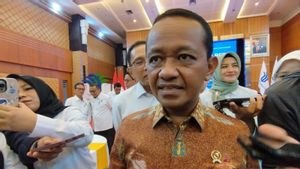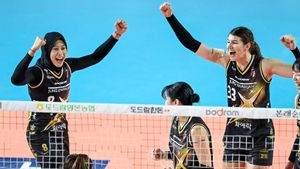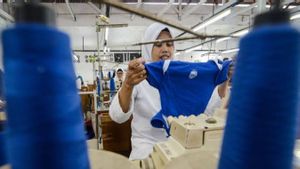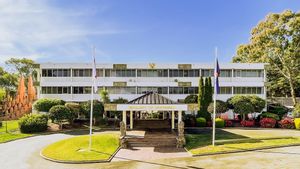JAKARTA - Religion and countries both need each other. Religion requires a forum to implement values, while state life requires religious values as a guide and reference for state life. The contribution of Islamic organizations involved actively in human resource development and economic empowerment of the people is a form of collaboration with the government.
In the United States, for example, large organizations and have many members, including religious organizations such as churches. Therefore, the church becomes very important. Variations in church organizations are very decisive because they can mobilize politics to mediate between ordinary citizens or members of the congregation and certain presidential or political parties.
White churches usually have traditional relationships with Republicans. Meanwhile, churches owned by black citizens have close ties to the Democratic Party. Meanwhile, organizations outside of religion are labor organizations, businesses, sports, and others. The function is the same, namely to become an organization that mediates citizens with political groups such as political parties or presidential candidates.
Not much different from the United States, In Indonesia, a large and well-established organization is a religious organization. For non-Islam, a large organization is a church. Meanwhile, for Islam, there are two largest organizations, namely Nahdlatul Ulama (NU) and Muhammadiyah. In addition, there are also youth mosques, Taklim assemblies, or certain pesantren.
The collaboration between Islamic organizations and the government is pursued with a religious moderation program that is included in the 2020-2024 National Medium-Term Development Plan (RPJMN). Religious moderation is a moderate perspective in religion, namely understanding and practicing religious teachings by not being extreme, both extreme right and extremal left. Moderation of religion is important to strengthen national commitment, active tolerance, and prevent extremist religious understanding.
The development of religious moderation in Indonesia is a strategic effort by the government in building inter-religious harmony. To get there, the role of Islamic organizations should not be forgotten as a central element in embedding national values.
SEE ALSO:
Religious organizations, especially Islamic organizations, have given their own colors in the course of the history of the Indonesian nation, both from the pre-independence period and until now. There are at least more than 100 Islamic organizations that are mass organizations with a number of supporters reaching millions of people. This mass organization generally originated from a cultural movement that aims to strengthen the cultural foundation in people's lives with very diverse activities.
Islamic organizations cannot be underestimated because of their presence and involvement directly or indirectly affect government policies or the political order in Indonesia. Activities from these mass organizations are very diverse, but generally carry out religious activities (dakwah), education services, health, social, politics, to economic empowerment, as well as warding off terrorism and radicalism.
Saiful Mujani, director and researcher from Saiful Mujani Research and Consulting (SMRC) said religious organizations are civil society that can mediate between political entities and voters.
"That people who have the right to vote cannot be reached one by one because the number is very large, tens or even hundreds of millions. Efficient efforts that mediate between individual voters and political entities that they want to support (parties or candidates) are organizations, churches, hobby organizations, sports, alumni of schools, and others. These organizations are later referred to as civil society," he said. Saiful Mujani
Saiful further explained that several political parties in Indonesia have a special relationship with mass organizations, for example between the National Awakening Party (PKB) and NU. PKB was born from NU. At least the main figures in NU gave birth to PKB. PKB was founded by Abdurrahman Wahid ahead of the 1999 elections. Likewise, the National Mandate Party (PAN) has a special relationship with Muhammadiyah. Meanwhile, the United Development Party (PPP) has a special relationship with Masyumi, NU, Parmusi, and also elements of Muhammadiyah.
Religious organizations, both Nahdlatul Ulama (NU) and Muhammadiyah as well as other community organizations, were actually born from political movements, in the political sense as policies or policies. Moh emphasized this. Mahfud MD at the opening of the Regional Working Meeting (Rakerwil) GP Ansor in 2013. Mahfud added that GP Ansor is part of state policy science. Also as part of the organization that was born to influence state administrator policies, presidential policies, governor policies and other policies.
"It is a political movement even though it is not carried out by political parties. Therefore you are the product of the political movement," said Mahfud.
According to Mahfud, this was also stated by Bung Karno in his June 1, 1945 speech. If Muslims want Islamic law to inspire the Law (UU), they must fight as hard as they can. "You can enter the middle of society not wearing political party clothes, but using how to influence public policies, how to build people to be aware of their constitutional rights," said the man from Madura.
He further said that religion and politics are two things that cannot be separated, such as a piece of metal, religion is the basis, principle, and guide and vision in the struggle. And politics as a guardian so that the struggle can run, because the noble values of religion will not run without politics. And political power without religion can be heretical and evil, "said Mahfud.
The Purpose Of Establishing Ormas In Accordance With The 1945 Constitution
The former Minister of Religion for the 1993 period 1998 Dr. H. Tarmizi Taher explained that religious organizations are the nation's tents. Citing his biography entitled Bridges of the Ummah, Ulama and Umara (1998) explained that the role of the minister of religion must be intensive with the ulama.
The Ministry of Religion places all religious organizations as strategic partners in building people and maintaining national unity. National development requires the involvement of religious organizations in a synergistic and mutualistic development ecosystem. The Ministry of Religion's collaboration program with all religious organizations needs to be increased without making religious organizations lose independence due to dependence on government assistance.
"Perhaps the Minister of Religion never calls the figures of religious organizations. Well, for that I don't go through the paths that are too formal", said the sentence in Tarmizi Taher's biography.
It is important to know that mass organizations are voluntary, social, independent, non-profit, and democratic. Then, regarding their characteristics, community organizations can include certain characteristics that reflect the wills and ideals that do not conflict with Pancasila and the 1945 Constitution.
Based on Article 5 of Law 17/2013 jo. The Constitutional Court's decision 82/2013, it is explained that the formation of community organizations aims to increase community participation and empowerment, provide services to the community. maintaining religious values and trust in God Almighty, preserving and maintaining the norms, niai, morals, ethics, and culture that live in society, preserving natural resources and the environment, and strengthening national unity and integrity.
Then, regarding membership, Article 33 of Law 17/2013 explains that every Indonesian citizen has the right to become a member of a community organization. Membership of community organizations is also voluntary and open. All rules regarding membership of community organizations are regulated in AD and/or ART.
The discourse of giving mining business to religious organizations that are now rolling can be contrary to the purpose of forming mass organizations. If this is related to'repaying services' after the 2024 presidential election, religion and religious symbols should not be traded for political purposes for a moment.
The current legislative, presidential and regional elections elections are not an ideological battle, but a battle over ideas and concepts to build a better Indonesia. For this reason, the neutrality of religious mass organizations and the peace of places of worship must be maintained from practical political frenzyes. Election implementation is not to make people and citizens of the nation divided, become noisy, or face each other because of different choices
The English, Chinese, Japanese, Arabic, and French versions are automatically generated by the AI. So there may still be inaccuracies in translating, please always see Indonesian as our main language. (system supported by DigitalSiber.id)
